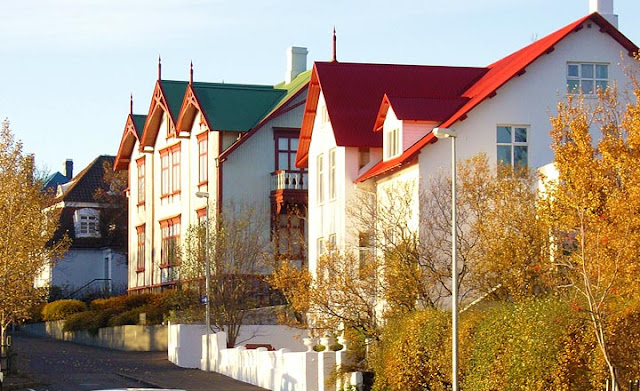Mondays In Iceland - #4
The Atom Station

U.S. Military base, Keflavík
"But the people did nothing. The people are children. They are taught that criminals live in Skólavörðustígur and not Austurvöllur. Their faith in this wavers a bit, perhaps, from time to time, but when politicians have sworn often enough and hurrahed for long enough, they begin to believe it again. People don't have the imagination to understand politicians. People are too innocent."
Halldór Laxness' post-WWII satire The Atom Station has many parallels to the current Kreppa (crisis) in Iceland. As the story begins the country is in turmoil, there are demonstrations in the streets, and foreign powers threaten Iceland's recently won independence. Ugla (the name translates as "owl") is a young woman from the rural north, who finds employment as a housekeeper at the home of Búi Árland: Businessman, Doctor of Philosophy and Member of Parliament. In Ugla's eyes Búi's wife and children are spoiled rotten, symptomatic of the degenerate modern life in the city. When asked as to why she is in Reykjavík, Ugla says that she has come "south" to learn how to play the harmonium for church services back home. As the story progresses, however, she reveals that her real longing is to "...become a person, to know something, to be able to do something for myself..."
She takes "lessons" from a strange "organist" and his suspect circle of "friends." These lessons are as much about the way the world works as they are about music. Ugla also encounters a "cell" of Communists, further raising her awareness. Meanwhile, Búi hosts U.S. military men and members of parliament during negotiations to "sell the country" for an "atom station"- an event which did, in reality, lead to the existence of a U.S. military base in Keflavík for nearly sixty years.
All this inter-twined plot gives plenty of room for Laxness to explore the social issues of the day. Many of them, such as fraudulent deals by sham Icelandic businesses, read as if they were torn from today's headlines. Ugla's faith in the values of her rural upbringing is challenged, but she is ultimately true to it in her refusal to become Búi's mistress. Her decision to start a family with the somewhat shady man who fathered her child, while possibly not the best choice (although he is a Northerner), is a life of her choosing.
This book isn't on the epic scale of some of Laxness' other works, but I found it to be an enjoyable read- and much better the second time after I had gotten a little more background on its setting and themes. It has a much faster pace than most of his others, the whole novel unfolds in less than a year. Laxness again shows sensitivity and insight in handling a female character, and while Ugla is hardly the heroic figure portrayed in Salka Valka, her character has real depth. I've found myself quoting this book on more than one occasion. It might be a bit bewildering at times for the beginning Laxness reader, but it is a solid effort by a truly great novelist.
I'll leave you with these thoughts from the "simple" farm girl Ugla as she prepares to leave home:
"When the peace of Autumn has become poetic instead of being taken for granted...the last day of the plover become a matter of personal regret...the horse become associated with the history of art and mythology...the evening ice-film on the farm stream become reminiscent of crystal...and the smoke from the chimney become a message to us from those who discovered fire - then the time has come to say goodbye. The world-bacterium has overcome you, the countryside has turned into literature, poetry and art; and you no longer belong there."
My Laxness blog-pal Rose has also read and reviewed this book.



























